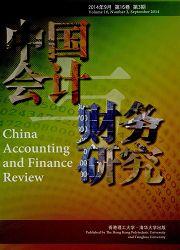Do bankrupt firms recognize publicly available bad news in a timely fashion?
引用次数: 1
Abstract
PurposeThe purpose of this paper is to examine whether managers of bankrupt firms are more or less conditionally conservative in their financial reporting relative to non-bankrupt firms. The study further examines the cross-sectional differences in conditional conservatism among bankrupt and non-bankrupt firms.Design/methodology/approachThe study employs a sample of US firms to investigate conditional conservatism in firms that experience financial distress and go bankrupt relative to non-stressed non-bankrupt firms. The study also uses switching regression models to identify the drivers of the cross-sectional difference in conditional conservatism among bankrupt and non-bankrupt firms.FindingsEmpirical results show that bankrupt firms are timelier in recognizing bad news than good news when compared to non-bankrupt firms. The higher level of conditional conservatism in bankrupt firms is mainly driven by their higher levels of leverage and tax-reduction incentives. The cross-sectional analyses show that these results largely hold for more leveraged firms and firms with higher tax costs. Taken together, these results suggest that the conservative tendency of managers of bankrupt firms can stem from the agency problem between lenders and managers and from tax-decreasing motivations.Originality/valueThe novelty of the authors’ research stands in studying the drivers of the cross-sectional differences in conditional conservatism between bankrupt and non-bankrupt firms and specifically, the demonstration that taxation also induces conditional conservatism in the setting of ex post bankrupt firms.破产公司是否能及时发现公开的坏消息?
目的本文的目的是检验破产公司的经理在财务报告中相对于非破产公司是否或多或少具有条件保守性。该研究进一步考察了破产公司和非破产公司在条件保守主义方面的横截面差异。设计/方法/方法该研究采用了一个美国公司的样本,调查与非压力非破产公司相比,经历财务困境并破产的公司的条件保守主义。该研究还使用切换回归模型来确定破产公司和非破产公司条件保守主义横截面差异的驱动因素。实证结果表明,与未破产的公司相比,破产公司在识别坏消息方面比识别好消息更及时。破产公司的条件保守主义水平较高,主要是由其杠杆率和减税激励水平较高所驱动的。横断面分析表明,这些结果在很大程度上适用于杠杆率较高的公司和税收成本较高的公司。总之,这些结果表明,破产公司经理的保守倾向可能源于贷款人和经理之间的代理问题以及减税动机。独创性/价值作者研究的新颖性在于研究破产公司和非破产公司之间条件保守主义横截面差异的驱动因素,特别是证明税收也会在破产后公司的环境中引发条件保守主义。
本文章由计算机程序翻译,如有差异,请以英文原文为准。
求助全文
约1分钟内获得全文
求助全文

 求助内容:
求助内容: 应助结果提醒方式:
应助结果提醒方式:


